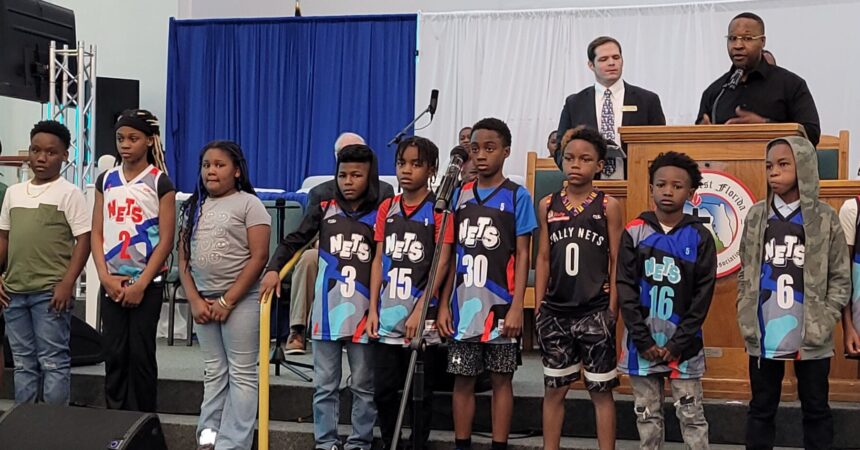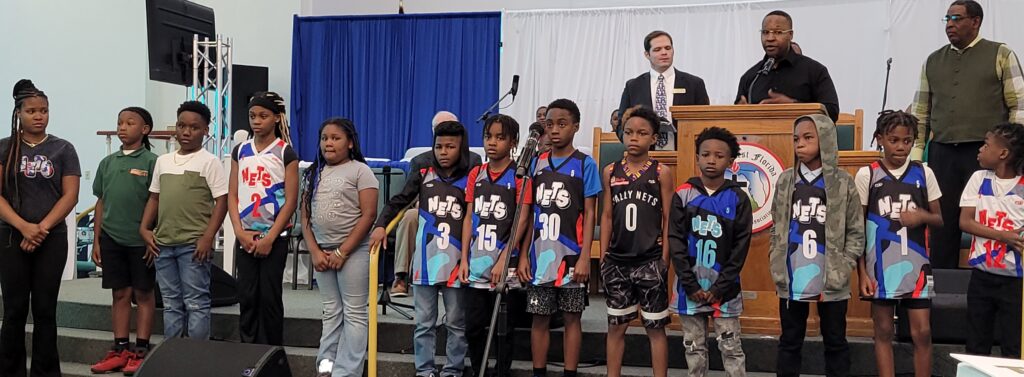
Seeking answers
CAJM leadership asks elected
official for housing, crime solutions

Photo by St. Clair Murraine

Photo by St. Clair Murraine

Photo by St. Clair Murraine
By St. Clair Murraine
Outlook Staff Writer
Since its inception five years ago, Capital Area Justice Ministry has been calling on city and county government to commit to “evidence based” fixes for housing and crime problems.
The group made up of local clergy is specific to affordable housing for low-income families and fighting gun violence. Those were two issues that CAJM wanted to get a firm yes or no on from elected officials.
City Commissioner Curtis Richardson and County Commissioner Bill Proctor were summoned to the stage at the Old West Florida Enrichment Center. More than 700 turned out to hear their responses to questions that CAJM sent to the respondents before last Tuesday night’s event.
Even before the ground rules were established for the night, Hugh Chapman, of St. Michael and All Angels Episcopal, spelled out the purpose of the gathering.
“Our objective tonight is to get clear answers from public officials regarding these serious problems,” Chapman said.
Then, there was a call for taking the responses to the next level when both board hold their meetings.
“We want to know that when the conversation goes to the next place behind the table that there is a level of accountability,” said Rev. Latricia Scriven, co-president of CAJM. “That we’re here in this space is actually what happens because we have individuals who put a lot of time into doing the research.”
The audience was also informed to show its responses with applauds for yes answers and silence for no. Elder Connel Leonard of Elizabeth Popular Springs PBC, beseeched them not to be reluctant if they have to remain silent.
“There is power in you silence,” Leonard said. “Maybe uncomfortable but I need you to risk being uncomfortable for a few moments so we can address the fear, despair and helplessness that many feel because gun violence happens around them, or because so much of their hard-earned money must go to housing; leaving them little to buy food or pay bills.”
And so the question about affordable housing was presented to Richardson first. The moderator prefaced it by pointing out that Collier and Pinellas counties are creating affordable housing for low-income families through a penny tax that funds a land purchase and leaseback program.
Richardson and Proctor were asked if they would seek similar funding from through their respective commissions.
Saying he needed more information on how the Pinellas program works before answering, Richardson made a point of stressing that he is on the affordable housing advisory council and has voted to support development of Columbia Garden at South City.
His answer didn’t sit well with the crowd, based on a smattering of chatter.
However, he later said he would support a motion to seek funding for affordable housing through Blueprint. Richardson also said he would support using money from some capital projects but such funding isn’t available.
Proctor, who answered “Yes, I will” to the housing question, said he’ll also support trimming funding from some Blueprint capital projects for affordable housing.
He also called on CAJM to appeal to the federal government to release some of the land it owns in the county for housing.
“I don’t see why our local government has not petitioned the federal government for land that they are not using to be utilized for affordable housing,” Proctor said, adding that some of the federal land could also be used for other quality of life projects.
A “Focused Deterrence” approach to solving gun violence seemingly received support from both commissioners. Commissioners from both government who were in the audience also said they would back the concept.
Royle King, executive director of the Council on the Status of Men and Boys, meticulously outlined details about areas where gun violence is highest. Those areas will require “hot spot policing,” he said.
“I think we can agree that gun violence is a community wide problem,” King added. “However, we are seeing it in small pockets in our communities. So, that requires a focus in those places; not only just with law enforcement presence but infusing our community with resources.”
Before he left the stage, he called on the audience to become engaged in solving gun violence.
“We will not be successful without the support of everyone in this room,” he said.
Both of the issues that CAJM brought to the public resonated with Rocky Hanna, Leon County Superintendent of School. He reiterated the need for affordable housing, mentioning that 1,000 homeless students attend schools in the district.
Hanna, who worked his way up from being a school hall monitor, said he is troubled by the recent increase in crime that he is seeing.
“This Tallahassee I see today is very different from the Tallahassee that I saw when I was younger,” Hanna said. “I’ve been to three funerals in this church alone for our students that were killed. This (gun violence) is real.
“I will do whatever I can from my position as superintendent of schools to help with both of these issues, whether its gun violence or affordable housing. We are all in to help find solutions. We can and we must do better.”
Throughout the discussion, a group of children who were later introduced as members of the Tallahassee Nets basketball team, sat on the stage. They were later brought in front the audience by Bryan Stringer from the Jacobs Chapel Baptist church, who said each of them could relate to the devastation of gun violence.
“I don’t want you all to look at me. I want you all to look at these kids because I was once them and had it not been for someone intervening in my life I probably would not have made it here,” Stringer said. “The way gun violence is going in our community right now there is a (chance) they might not make it. I brought them because each of these kids have been affected by gun violence – not around the corner or down the street.”







